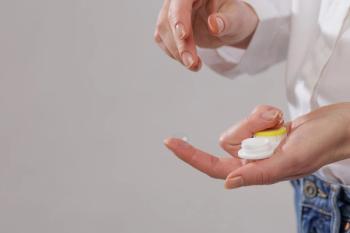
Improving dry eye comfort and vision with lipid-containing lubricating drops
The lipid-containing lubricating drop established noninferiority in comfort when compared to non-lipid drops, and the lipid-containing group also exhibited statistically significant improvements in visual quality at both day 7 and day 30, highlighting the potential benefits of this formulation for patients.
Dry eye disease is a complex and multifactorial condition that can significantly impact a patient's quality of life. While many lubricating eye drops are available to help manage dry eye symptoms, not all formulations are created equal. A recent study presented by Bridgitte Shen Lee, OD, FAAO, FBCLA, FEAOO, at the Tear Film and Ocular Surface meeting in Venice, Italy, sheds light on the potential benefits of a novel lipid-containing lubricating eye drop.
In her poster presentation, Shen Lee compared the performance of this new lipid-containing drop to an existing non-lipid lubricating eye drop. The primary endpoint of the study was to establish noninferiority of the lipid-containing formulation in terms of overall comfort, as measured by a visual analog scale (VAS) score. Remarkably, the results showed that the lipid-containing drop not only met the noninferiority criteria, but also demonstrated statistically significant improvements in visual quality. "Prescribing a lipid-containing lubricating eye drop for those patients who suffer from dry eye symptoms, especially those with an evaporative component, is much better for these patients in terms of both comfort improvement and quality improvement," explained Shen Lee.
The study enrolled 161 subjects, with 158 being randomized and 130 completing the 30-day trial. The lipid-containing group showed a mean VAS score improvement of 21.4 at day 30, compared to 10.0 in the non-lipid group, meeting the noninferiority threshold. Importantly, the lipid-containing group also exhibited statistically significant improvements in visual quality at both day 7 and day 30, highlighting the potential benefits of this formulation for patients.
Shen Lee emphasized that not all lubricating eye drops are created equal, and that prescribing the right type of lubricating drop can achieve more than just comfort improvement. With approximately 86% of dry eye patients having an evaporative component, the lipid-containing formulation may be an ideal choice for many of these individuals. As optometrists continue to navigate the complex landscape of dry eye management, studies like this provide valuable insights into the potential advantages of innovative lubricating drop formulations. By understanding the unique properties and clinical performance of these products, eye care providers can make more informed decisions to better serve their patients with dry eye disease.
Newsletter
Want more insights like this? Subscribe to Optometry Times and get clinical pearls and practice tips delivered straight to your inbox.





























